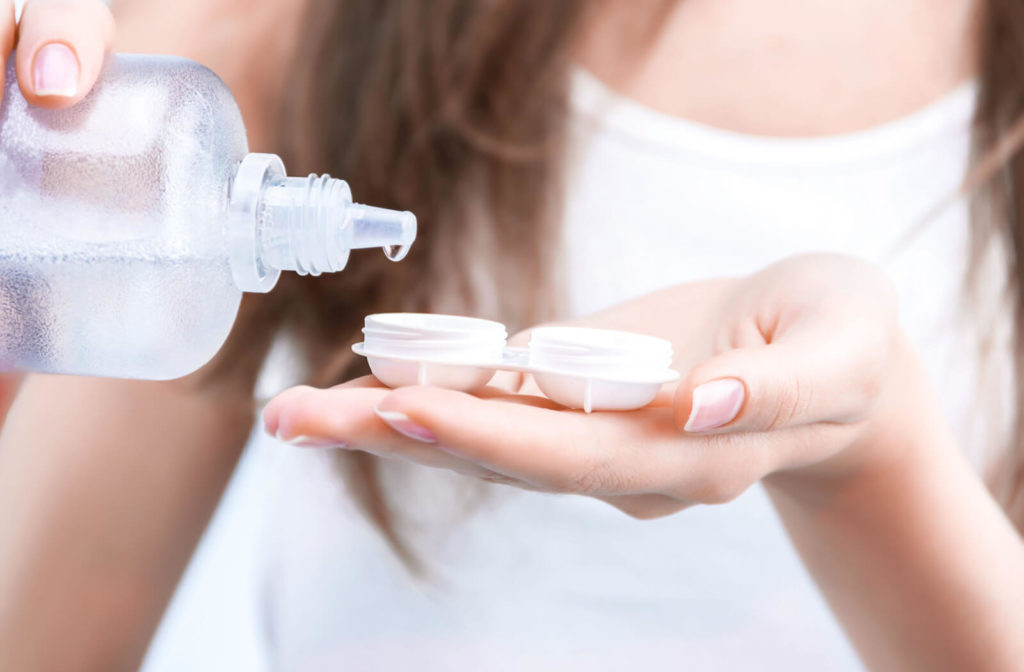Wear Over Time
Caring for your contact lenses is essential for eye health and vision. It can also help your contact lenses last longer. Still, your corrective lenses are vulnerable to wear over time and must be replaced when appropriate. For many patients, following the recommended planned replacement is simple enough, but there’s another replacement schedule to consider.
Some contact lenses come with an expiration date. So, what does this date mean for your contact lenses?
Soft vs. RGP Expiration
For people familiar with contact lenses, you’re likely aware there are 2 main contact lens types: soft and rigid gas permeable (RGP).
Soft contact lenses are flexible and form snugly to the cornea (the eye’s front surface). People with active lifestyles often prefer the close fit as the lens is less likely to slip or fall out. Soft contact lenses are usually easier to get comfortable with initially and are the most popular type.
Soft contact lenses absorb water to prevent the lens from drying out. As a result, the lenses attract organic deposits of protein and lipids.
Rigid gas permeable (RGP) lenses are durable and allow oxygen to reach the eye. RGP lenses are sometimes called hard contact lenses, although there is some give to the material. The sturdier lens provides sharper vision, as the lens retains its shape even as you blink. Also, the material is resistant to deposit buildup, as they don’t contain water.
Both types of contact lenses have advantages and disadvantages, which is why hybrid contact lenses often combine the best of both. The best type of contact lens for you depends on your eye health, comfort, and lifestyle.
Soft contact lenses are disposable and designed for planned replacement periods. For example, some contacts are daily-use, meaning the contact lenses are disposed of after one wear (usually at the end of the day). However, soft contact lenses may be designed for weekly or monthly replacement periods.
RGP contact lenses are designed for longer periods of wear. When you take good care of your RGP contacts, a single lens can last 2–3 years. Unsurprisingly, this longer-wear style means your RGP lenses don’t have an expiration date.
Instead of “going bad,” RGP wearers need to note whether their lenses are still in good condition or if their prescription is still accurate.
It’s also crucial to check your cleaning and lens care products for expiration dates. When your cleaning solution has expired, it may be contaminated, which can introduce bacteria to your lenses or lens case. Similarly, don’t “top off” the solution in your lens case, as it has been exposed to bacteria and organic deposits.
Why Do Soft Contacts Expire?
Soft contact lenses can expire. Unlike RGP contact lenses, soft lenses are packaged in sealed containers with liquid. The liquid—a mixture of sanitizing saline (salt water) and a rewetting agent—helps keep the lens clean and wet. Although the packaging should be secured, the seal can weaken over time. The expiry date is when the manufacturer can no longer guarantee the seal is safe.
After the expiry date, there’s a risk that the weakened seal may have exposed the contact lens. The liquid inside may have dried out, damaging the lens. The fluid may be contaminated even if the container seems intact and there’s still liquid inside.
Never use expired contact lenses, even if the package seems safe. There may be damage you can’t see, including an invisible-to-the-eye hole or crack in the seal.
It’s also crucial to avoid over-wearing your lenses or extending a replacement period beyond the manufacturer’s recommendation. When you run out of soft contact lenses or you decide to keep wearing an opened package, you expose yourself to risks.
Overwearing soft contact lenses can lead to lactic buildup in the cornea and oxygen deprivation.
When you wear your lenses longer than recommended, whether to take a nap or avoid buying new lenses, you put your eye health at risk. Even lenses approved for overnight wear can be vulnerable to bacteria and deposit buildup. The lens may still feel comfortable, but there can be harmful interactions or lens damage you can’t see.
Replacing and cleaning your lenses as recommended decreases the risks of:
- Corneal abrasions or scarring
- Dry eye
- Eye infection
- Irritated or red eyes
- Light sensitivity
- Neovascularization
Why Do Prescriptions Expire?
Prescriptions for contact lenses and glasses have expiration dates. Unlike expired milk or grocery products, it’s not as easy to tell when your spectacles or contacts are unfit for use. To help safeguard your vision, optical prescriptions are valid for no longer than 2 years.
Your corrective lenses may be in good condition, and your prescription still accurate once those 2 years are up. But checking in with your optometrist at least every 2 years helps monitor your eye health. It’s also a chance to see if your lenses are still working for you, whether you want to order more of your favourite brand or try something new.
Keep Your Lenses Updated
When was the last time you had your lenses checked? Keeping your lenses updated—the prescription and the lens condition—is crucial to supporting your eye health and vision care. At Queensway Optometric Centre, we treat our patients like family and strive to provide quality vision care. Whether you need a routine eye exam or lens care tips, we’re eager to help. Contact us today!


